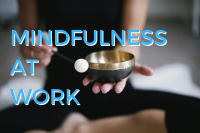In order to meet the intensive demands of a challenging environment, we need to build resilience.
For many of us, our working environments tend to involve a busy workload, high levels of stress and the need to keep up with changing conditions.
Consequently, managing the pressures of a career can be difficult.
But what exactly does it mean to be resilient?
How do we build a sense of resilience?
Why is resilience so important?

Resilience can be defined as the ability to recover from setbacks, adapt well to change and keep going in the face of difficulty.
According to one study, one of the biggest ‘drainers’ of resilience in the workplace is managing difficult people or tricky situations.
Another key ‘drainer’ was being overworked or having to withstand personal criticism.
Differentiating between those who are resilient and those who are not comes down to how you handle these situations.
In other words, keeping your head afloat in the ocean amidst thrashing waves and a strong current isn’t enough to constitute resilience.
Resilience is being able to swim against the tide and figure out how to reach the shore.
That means turning challenges into opportunities instead of squashing your problems so they seem manageable.
Resilience is how you can succeed in a fast-paced, high-pressured environment.

According to PsychCentral, several factors are associated with a sense of resilience:
- The capacity to make realistic plans and take steps to carry them out
- A positive view of yourself and confidence in your strengths and abilities
- Skills in communication and problem solving
- The capacity to manage strong feelings and impulses
However, developing these skills requires practice and persistence.
With that in mind, here are a few practical tips on how to strengthen your resilience in an industry that fluctuates with change and difficulty.
Embrace and Adapt
The most important quality of a resilient-being is their ability to adapt well to change.
Much like a chameleon changing the appearance of their skin, building resilience requires you to react to the changing demands of the work environment.
That means pushing forward in times of uncertainty and remaining flexible in the face of fear.
The more willing you are to accept change, the more flexible you’ll become when the next wave of disruption surfaces.
More importantly, you’ll develop the ability to think on your feet.
You’ll be capable of embracing change and finding solutions in difficult or uncertain circumstances.

Resilience & Routine
When our workload piles up, staying on top of our responsibilities can be daunting; it seems impossible to get on top of things.
To be resilient in the face of a heavy workload requires you to reevaluate your processes.
Don’t merely try and stay on top of your to-do list.
Instead, improve your way of handling a stressful work environment, not just the workload itself.
Think about how things are being done now.
Ask yourself how productivity can be improved, or stress reduced.
Remember, there’s always room for improvement and there’s always a solution waiting to be found.
Be realistic, be open to change and be ready to re-evaluate again if necessary.
 When The Going Gets Tough, The Tough Get Going
When The Going Gets Tough, The Tough Get Going
The emotional state of any individual heavily impacts the way you work and carry yourself throughout the day.
Having a positive attitude makes for a productive day – work is completed willingly with an upbeat attitude.
Conversely, feeling negative towards work will tarnish your ability to produce outstanding results.
With this in mind, the ability to manage strong emotions is just as important when developing a sense of resilience.
Imagine driving down a windy road as thick fog suddenly obstructs your view.
Continuing your journey safely requires patience and persistence.
In the same way, navigate your way through testing situations by remaining cool, calm and collected.
Managing the challenges of a career can be a challenge in itself.
However, building resilience will help you face career challenges with confidence.
You’ll be a problem-solver, a quick thinker and you’ll be able to adapt to whatever life throws at you – in or out of the office.
The next time you feel inundated with work and stress, remember: resilience creates brilliance.
Learn more about building resilience and stepping up at the 5th Women in Retail & FMCG Leadership Summit in September.
Remember to join us on LinkedIn or follow the WILMA LinkedIn group for more updates and development opportunities.
Written by Jaslyn Pal & Jack Nodding.









Leave A Comment